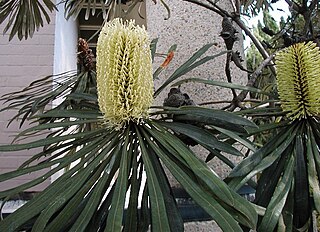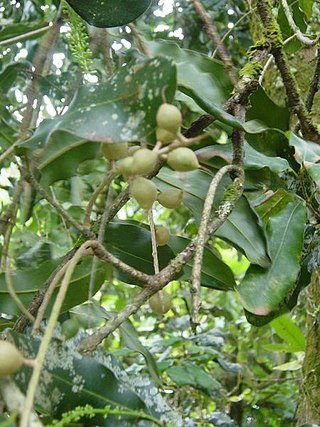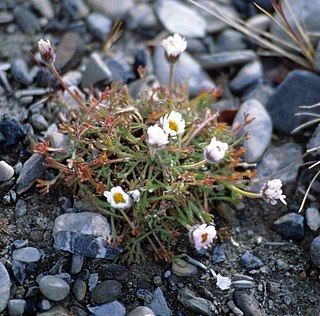
Grindelia (gumweed) is a genus of plants native to the Americas belonging to the family Asteraceae. The genus was named for Latvian botanist David Hieronymus Grindel, 1776–1836.

Grindelia squarrosa, also known as a curly-top gumweed or curlycup gumweed, is a small North American biennial or short-lived perennial plant.

Banksia aquilonia, commonly known as the northern banksia and jingana, is a tree in the family Proteaceae and is endemic to north Queensland on Australia's northeastern coastline. With an average height of 8 m (26 ft), it has narrow glossy green leaves up to 20 cm (7.9 in) long and 6 to 10 cm high pale yellow flower spikes, known as inflorescences, appearing in autumn. As the spikes age, their flowers fall off and they develop up to 50 follicles, each of which contains two seeds.
Ailanthus integrifolia, white siris, is a tree in the family Simaroubaceae. The specific epithet integrifolia is from the Latin meaning "entire leaves", referring to the leaflet margins.

Macadamia integrifolia is a small to medium-sized tree, growing to 15 metres in height. Native to rainforests in south east Queensland and northern New South Wales, Australia. Common names include macadamia, smooth-shelled macadamia, bush nut, Queensland nut, Bauple nut and nut oak.

Grindelia hirsutula is a North American species of flowering plant in the family Asteraceae known by the common names hairy gumplant and hairy gumweed.

Grindelia ciliata is a species of flowering plant in the family Asteraceae known by the common names Spanish gold, goldenweed, and waxed goldenweed.

Dryas integrifolia is a species of flowering plant in the rose family known by the common names arctic avens, entireleaf mountain-avens, white mountain-avens, northern white mountain avens, and mountain avens. It is native to northern parts of North America, where it occurs from Alaska across Canada to Greenland. It is a common species of the Arctic and it is probably the most common flowering plant on some of the western Arctic islands.

Grindelia lanceolata is a species of flowering plant in the family Asteraceae known by the common name narrowleaf gumweed.

Grindelia adenodonta, the Lonestar gumweed, is a species of flowering plants in the family Asteraceae.
Grindelia arizonica, the Arizona gumweed, is a North American species of flowering plants in the family Asteraceae. It is native to the southwestern United States and northern Mexico, in the States of Coahuila, Chihuahua, Arizona, New Mexico, Utah, Texas, and Colorado.
Grindelia decumbens, the reclined gumweed, is a North American species of flowering plants in the family Asteraceae. It is native to the southwestern United States, in the States of New Mexico and Colorado.

Grindelia fraxinipratensis, common name Ash Meadows gumweed, is a North American species of flowering plants in the family Asteraceae. It is native to the southwestern United States, in Mojave Desert regions in Nye County in Nevada and Inyo County in California. Some of the Nevada populations lie inside the Nevada Test Site of the United States Atomic Energy Commission
Grindelia microcephala, the littlehead gumweed, is a North American species of flowering plants in the family Asteraceae. It is native to the south-central United States, having been found only in the state of Texas.
Grindelia oolepis, the plains gumweed, is a North American species of flowering plants in the family Asteraceae. It is native to the south-central United States, having been found only in the State of Texas.
Grindelia oxylepis, the Mexican gumweed, is a North American species of flowering plants in the family Asteraceae. It is native to northern Mexico, in the States of Chihuahua, Coahuila, Durango, San Luis Potosí, and Zacatecas. The natural range barely crosses the Río Grande into the United States, with a few populations in western Texas and southern New Mexico
Grindelia pusilla, the little gumweed, is a North American species of flowering plants in the family Asteraceae. It is found only in the state of Texas in the south-central United States.
Grindelia subalpina, the subalpine gumweed, is a North American species of flowering plants in the Astereae tribe of the family Asteraceae.

Arctanthemum integrifolium, the entire-leaved daisy, is a subarctic species of plant in the sunflower family. It grows in Alaska, northern Canada, Peary Land in northern Greenland, and the East Chukotka region of eastern Russia.

Zamia integrifolia, also known as coontie palm is a small, tough, woody cycad native to the southeastern United States, the Bahamas, Cuba, and the Cayman Islands.












